The Evolutionary Psychology of Men's Insecurity (Patreon)
Downloads
Content
While doing a lot of research into the function of testosterone the past couple weeks in preparation for a workshop I’m putting together, I’ve gotten more and more interested in the differences between men and women’s psychology. As discussed in a previous post, men have around 10x the testosterone of women and women have around 4x the estrogen and 4x the oxytocin of men. Each of these neurotransmitters have an effect on our physiology, behaviors, our values, the types of fantasies we have an so on.
In general, testosterone mostly encourages men to be concerned with their achievements, accumulation of resources, competition and so on. Testosterone will make a man more impulsive, persistent, focused, more willing to put in effort, he will be more interested in competition and taking risks, he will have less social anxiety, he will be more willing to talk to women, and he will even be more likely to risk his life to save others. This comes with tradeoffs of course, an aggressive testosterone-fueled man chasing women and putting in 80 hour work weeks at the office to show up that prick Tom may not be the best person to help take care of an infant. In fact, it’s thought that the reason men naturally experience a decrease in testosterone when they become fathers is so that they will want to spend more time with the child and less time on solo-pursuits of more women, resources or status.
<figure>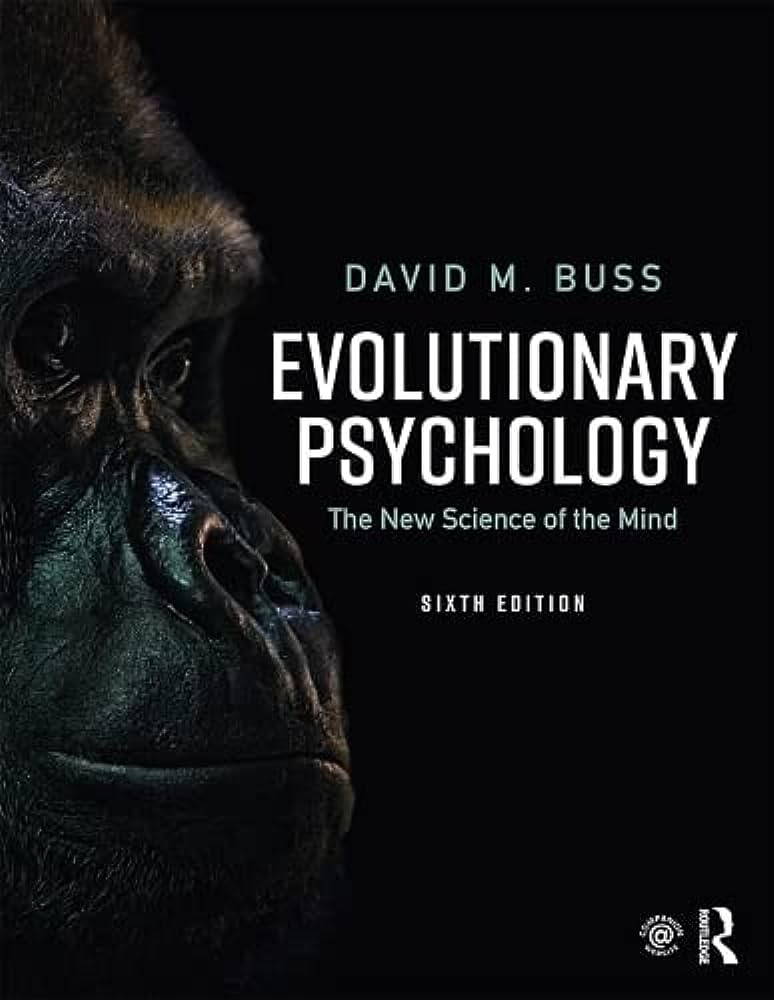 </figure>
</figure>Recently I picked up Dr. David Buss’s textbook Evolutionary Psychology. Just like we can get a better understanding of how men operate and what’s ‘good’ for men by looking at the function of neurochemicals like testosterone, I think Dr. Buss’s book is a good resource for understanding men and how their hardwiring differs from women.
The “born sexy yesterday” trope in sci-fi movies (a term coined by Pop Culture Detective) illustrates men’s preferences quite well. Born Sexy Yesterday refers to a very attractive woman who is naive, inexperienced and has little to no familiarity with the male protagonist’s world. The highly ignorant woman is very easily impressed by the main character and is easily attracted to him, especially since she has absolutely no past male companions to compare him to.
The average man’s requirements for woman don’t include too many achievements. Of course we don’t want a woman who is completely unfamiliar with the ways of the world, but If a woman appears mentally stable, unmalicious, meets a baseline of intelligence, has a reasonable sense of humor and is attractive she has a very good chance with the average man. The average woman on the other hand typically has a longer list of harder to meet requirements will be some mixture of: tall, attractive, muscular, healthy, wealthy, high(er)-status, ambitious, industrious, humorous, charismatic and so on.
So in this article we’ll take a look at a couple different points including:
・A man increasing his socioeconomic status will make him more attractive.
・A woman increasing her socioeconomic status will decrease the pool of men she herself is attracted to.
・Socioeconomic status is far less attractive to men than it is to women.
・Based on the nature of oxytocin and vasopressin, men’s preferences aren’t “insecure” but natural and logical.
・Men understand it requires a lot of effort to attract women; they have no interest in increasing this difficulty.
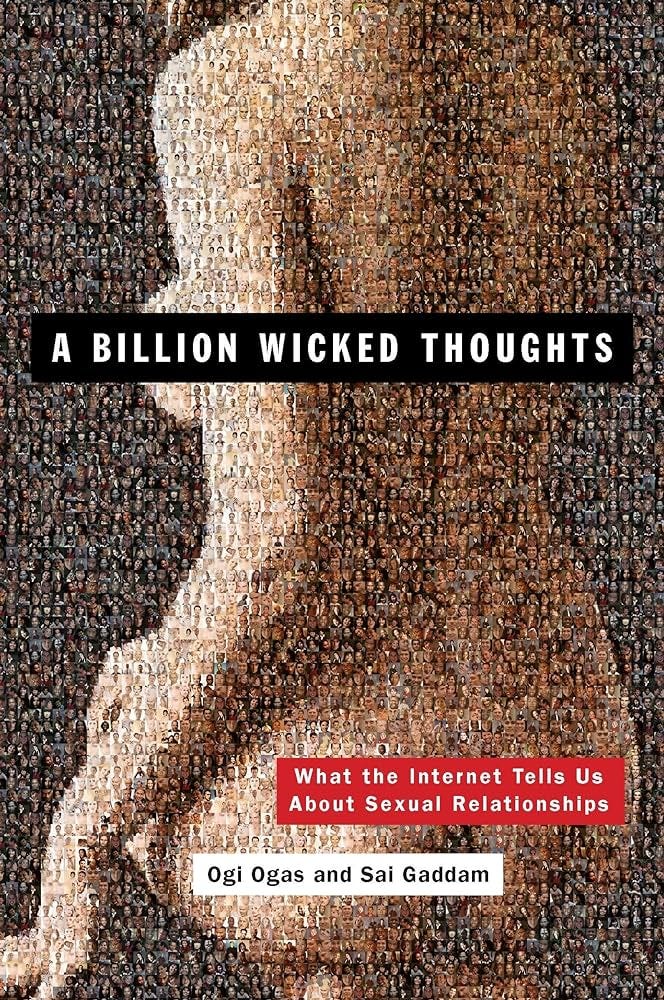 </figure>
</figure>Achievements vs. Innocence
As explained in the book A Billion Wicked thoughts, Maryanne Fisher and Tami Meredith analyzed over 15,000 Harlequin romance novels, and found that these were the top ten most common male heroes they found:
Doctor
Cowboy
Boss
Prince
Rancher
Knight
Surgeon
King
Bodyguard
Sheriff
“Women appear to have solved the adaptive problem of acquiring resources in part by preferring men who are high in status.”
<figure>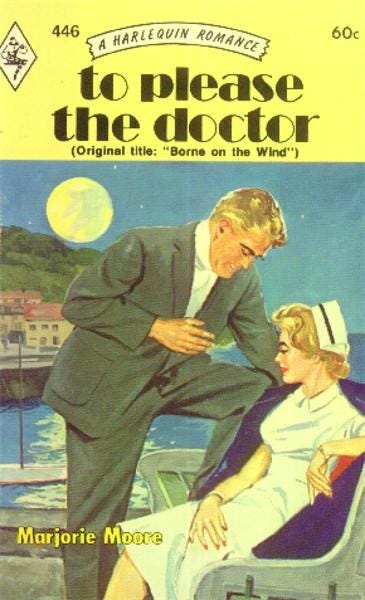 </figure><figure>
</figure><figure> </figure>
</figure>Notice how “naive and ignorant man with no wealth or status” did not make the list. In stark contrast to the “born sexy yesterday” trope, all of women’s fantasies involve men who are very masculine, competent, wealthy, high in status or a mixture of these. As Pop Culture Detective presents in his video, the “born sexy yesterday” trope is rarely used to make a male character appear extra appealing to the women in the movie. It’s either used as a source of comedy, or if a woman does become attracted to a highly naive male character, it will be in spite of his ignorance and inexperience.
As explained in Dr. David Buss’s book, the reason women are much more choosy is that they have to invest much more into their offspring.
In summary, Triver’s (1972) theory of parental investment and sexual selections makes two profound predictions: (1) The sex that invests more in the offspring (typically, but not always, the female) will be more discriminating or selective about mating; and (2) the sex that invests less in offspring will be more competitive for sexual access to the high-investing sex.
The data suggests that where the average woman is very concerned with men’s financial prospects, men care much less about women’s socioeconomic status:
“A study of Chinese, European, and American individuals found that a potential mate’s salary had four times the impact on women’s judgements of men’s attractiveness compared to men’s judgements of women’s attractiveness (Wang et al., 2018)”“In the overwhelming majority of cultures, women value ambition and industriousness more than men do, typically rating them as between important and indispensable.”<figure>
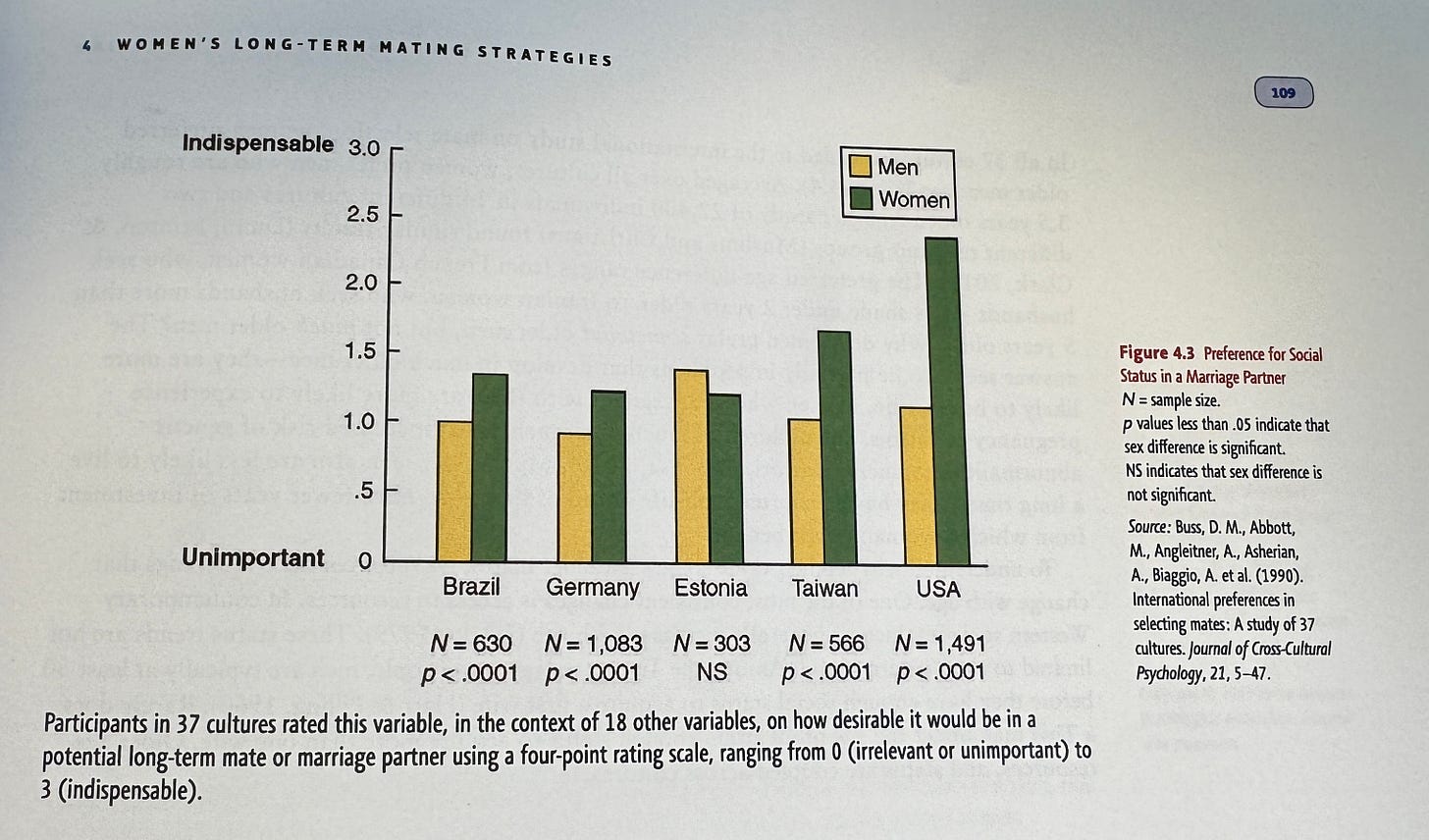 </figure>
</figure>As discussed in my interview with Rachel Wilson, there are several downstream effects of feminism that are not often spoken about. For example, the drive to have more women in higher positions in the work place making more money for themselves will reduce the pool of men these women are likely to be attracted to.
Some scholars surmised that the reason women want men with more ambition and resources than them was simply that women were not in a position to acquire resources as easily as men, so they had to rely on men for resources. By this logic, women should care less about men’s resource gathering abilities as they accrue resources themselves. However multiple studies suggest that women consistently raise their standards as their own income and education levels increase. That is as women become better educated and better paid, they prefer men who are even more educated and make even more money than them.
<figure>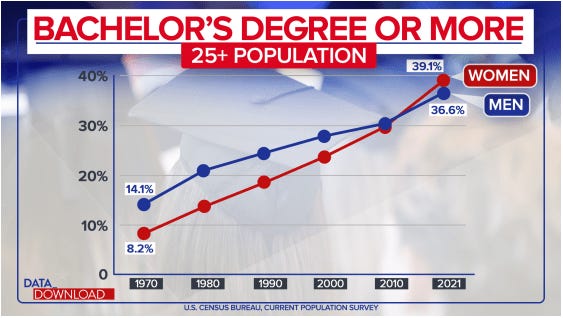 </figure><figure>
</figure><figure>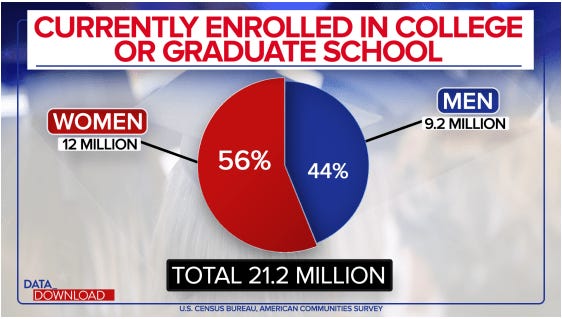 </figure>
</figure>On that note, women are now outnumbering men in colleges and holding more bachelor degrees than men.
<figure> </figure>
</figure>Increasing the attractiveness threshold
Recently I watched the Netflix movie Fair Play. It follows the lives of Emily and Luke who are breaking company policy at the finance firm they both work at by dating each other. During an unnecessarily gross scene where Emily and Luke laugh about her menstrual blood getting all over him, Luke proposes to Emily. She gleefully says yes. Soon they are back at their apartment talking about the rumor they overheard that Luke will soon be promoted. Emily seems genuinely happy that Luke may get the promotion. However, it wouldn’t be long before the couple would find out that the promotion would in fact be awarded to Emily. Luke feigned excitement for Emily at first, but it was very clear that he was not happy about the situation. In fact, Emily was now Luke’s boss.
<figure> </figure>
</figure>The rest of the movie is basically Luke slowly going completely nuts (and developing erectile dysfunction) in response to Emily’s status exceeding his. The movie ends with a knife-wielding Emily intimidating Luke into saying how pathetic he is and Luke cries.
<figure> </figure>
</figure>While the movie is very over-the-top, there is some reality to the idea that the average man generally wouldn’t like it if their partner suddenly goes up in status and wealth relative to them. (The average man responding to such a situation like Luke did is very unrealistic, I hope.) It’s typically said that a man is “insecure” and “threatened” by his girlfriend or wife if he expresses concern about her moving up in rank or making more money than him.
Considering women in general are more attracted to men that make more money than they do, it’s understandable that the man becomes concerned when things change such that an opportunity arose for him to be (on paper) less attractive to his wife or girlfriend. Now, this could be an opportunity for the man to further impress her with his confidence and ambition by working even harder to then raise his own status above hers. However, most men will see it as the bar being raised, meaning more difficulty to maintain the woman’s attraction for him at the same level.
People may call a man “insecure” for not being excited about his love interest earning more than him, but we don’t praise a man for his “secureness” if he chooses to gain 80 lbs because he is so confident that his wife’s attraction for him won’t wane.
Emily was genuinely happy about the prospect of Luke getting a promotion. Luke however went as far as trying to sabotage Emily’s position after she got her promotion. In response to Emily’s increase in status, Luke got drunk, barged into a private meeting at the company and told the higher-ups at the company that Emily was going against company policy by having sex with her analyst (Luke).
Testosterone is all about social dominance and social competition and men have somewhere around 10x the testosterone of women. This may explain why men are often portrayed as being very uncomfortable with a situation where the man is suddenly in competition with his wife or girlfriend. On the other hand, women’s having 10x less the testosterone combined with women’s preference for richer and higher in status men explains why they typically aren’t bothered by and in fact would prefer if their husband moved to a higher position than them.
Based on what is discussed in David Buss’s Evolutionary Psychology (and common sense), women prefer men who are “better” than them on several metrics, especially competence. Women across various cultures consistently want men who are taller, older, stronger, richer, higher in status, more educated, more intelligent, funnier than them et cetera.
I’m not trying to make any sort of prescription of how things should be, especially considering how malleable social dynamics and people’s psychology is… but this introduces an interesting paradox. ‘Equal’ marriages are supposed to be best, yet women want partners who are …better than them. BYU.edu says “When partners in a marriage value equality, they see each other as equals, treat each other with respect, consider each other’s needs, and support one another.” Interestingly enough, the data suggests women would prefer a man who she sees as far more competent than her. Obviously I’m not saying she wants a more competent man who doesn’t respect or support her but the point is to say this word ‘equal’ needs to be better defined. The BYU article points out women traditionally do more housework and child rearing but doesn’t discuss discrepancies in contribution to household income. Anyhow, that’s a can of worms for another time.
Some men want to marry a woman who is older than him or who has more experience, education or status than him and that’s great - the point isn’t to criticize these types of relationships.
Rather, my point is to say it’s very ironic that men are accused of being “insecure” when they aim for women who are younger, less educated, less experienced and so on… yet in general women prefer men who are older, more educated, and more experienced. “Insecure” is mostly used to shame men into doing things that they naturally don’t want to do (or shaming them out of doing things they naturally do want to do).
For example, a 35 year old man wanting to date a 25 year old is “insecure” because he isn’t man enough to deal with a woman who has the same experience as him. (Whether he’s OK with probably not having too much in common with her is another issue.) His insecurity drives him towards wanting someone who is naive, ignorant and naturally submissive, something closer to “born sexy yesterday” trope. This is the conclusion of Pop Culture Detective’s video: that the born sexy yesterday trope stems from men’s “deep-seated insecurity,” and that the “crux of the trope is a fixation on male superiority, a fixation with holding power over an innocent girl.”
He ends the video saying:
“It’s a fantasy based on fear. Fear of women who are men's equal in sexual experience and romantic history, and fear of losing the upper hand to women. …So born sexy yesterday is a science-fiction trope that's designed specifically so male heroes get to automatically be the most extraordinary man in a woman's life. As such, the trope rests on some troubling patriarchal values about female purity and virginity. …By definition, characters Born Sexy Yesterday have no past lovers and no previous sexual experiences. She is framed as pure and innocent, sexually and romantically. … The male hero then avoids even the possibility of being compared, of being judged, of not measuring up [to other men]. At the end of the day, this is a male fantasy about escaping the humiliation of rejection. Since he's the first and only man in this woman's life, he gets to be the best by default. Which means he doesn't even have to try to be a better partner, a better boyfriend, or a better lover. …Of course the reality is that life experience is a plus and not a minus in relationships. And we need more media to reflect that. We need media where men enthusiastically embrace women who are their equals. Equals in everything, including in matters of love and sex. So to all you would-be science fiction writers out there, I’ll leave you with this: innocence is not sexy. Knowledge and experience, on the other hand, now that's, that's extremely sexy.”
I watched this Pop Culture Detective video a couple years back and at the time, I didn’t think too much of it. In fact, I thought it made a couple good points. However, on taking another look this analysis is wrong in many ways.
Youth means fertility
First, I think the reason Pop Culture Detective is so averse to this idea that innocence is sexy is because he is misunderstanding men’s desire for younger women as (a) men having a desire for ever younger women and (b) men only desiring younger women because they are easier to control and dominate. While men may indeed prefer women who will take their lead, this is not the only reason they prefer younger women. If that were true, then as Dr. David Buss explains, “we would expect that teenage males would also prefer younger women, but they don’t.”
A 1996 study by Kenrick et al surveyed 103 teenage males and 106 females ranging in age from 12 to 19. They found that “although teenage males were willing to accept dates with females who were slightly younger, they were far more willing to accept dates with older women. The “most attractive” age mirrors these findings, with adolescent males expressing a desire for dates who were several years older on average.”
Men do not desire younger women in general, they desire maximally fertile women. “Men desire young women because over evolutionary time, youth has consistently been linked with fertility.”
I’ve even seen some women online try to equate men’s preference for innocence or sexual purity to pədophilia. This is completely wrong.
As David Buss points out, “as men get older, they prefer as mates women who are increasingly younger than they are—a finding replicated in a large study of 21,245 individuals ranging from 18 to 65.” That is increasingly older men “women who are increasingly younger than they are,” not “increasingly younger.”
<figure>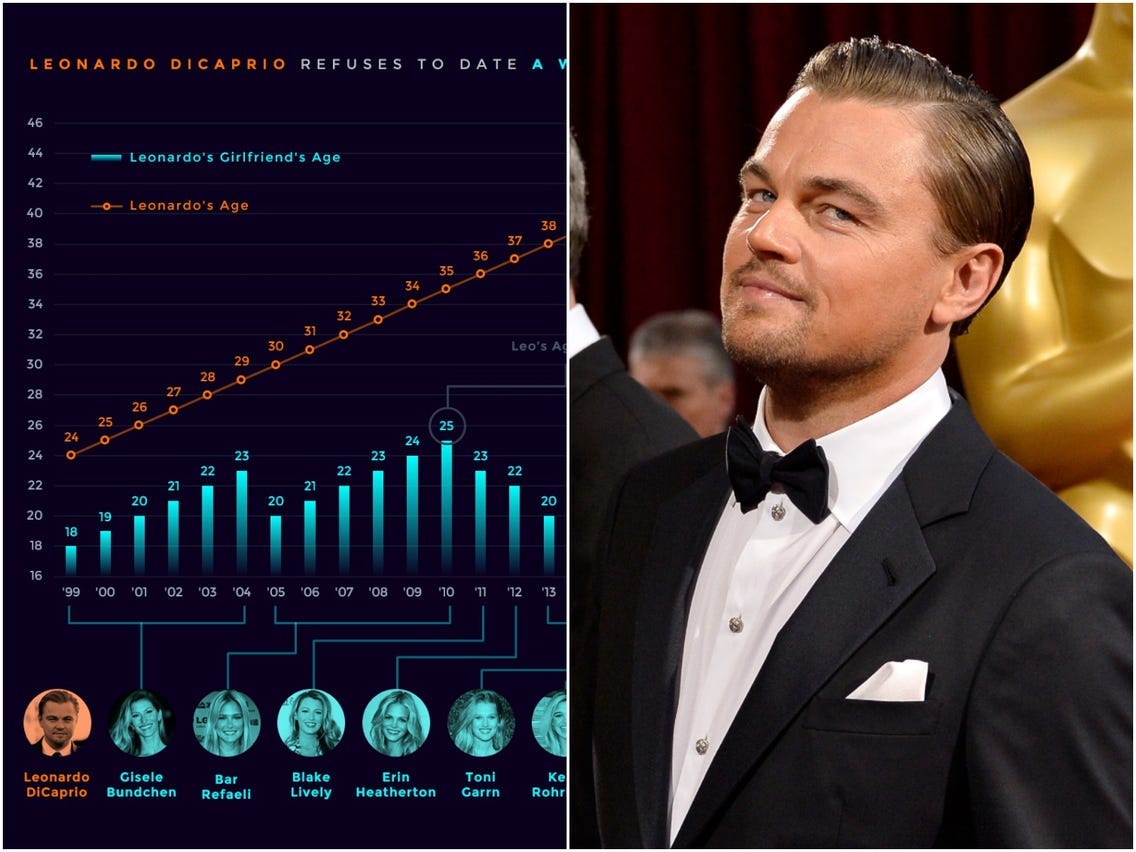 </figure>
</figure>Why ‘I can’t wait to compare you to all my ex-boyfriends’ isn’t sexy
Second, Pop Culture Detective criticizes the male desire to not be compared to other men as “insecurity.”
"The male hero then avoids even the possibility of being compared, of being judged, of not measuring up [to other men]”
I would say this desire is perfectly logical.
A 2023 paper looking at tens of thousands of people from the first, third and fourth waves of the National Longitudinal Study of Adolescent to Adult Health found that more sex partners before marriage meant higher chance of divorce.
Further, other data found that in specific, women who had more sex partners before marriage were more likely to get divorced.(S) So call it insecurity if you like, but if a man is looking to be paired with one woman for a long time, it’s wise to desire a woman with less sexual experience.
It’s easy to make a logical argument for this. If you have more points of comparison, it’s easier to nit-pick something. Chocolate chunk ice cream may continue to be your overall favorite ice cream even though you’ve tried 20 different ice cream flavors in the past, but these past experiences open your brain up to making comparisons like ‘actually sherbet would be more refreshing now that we’re at the beach’ or ‘I could go for a sweeter caramel ice cream after that salty meal.’
<figure>sitn.hms.harvard.edu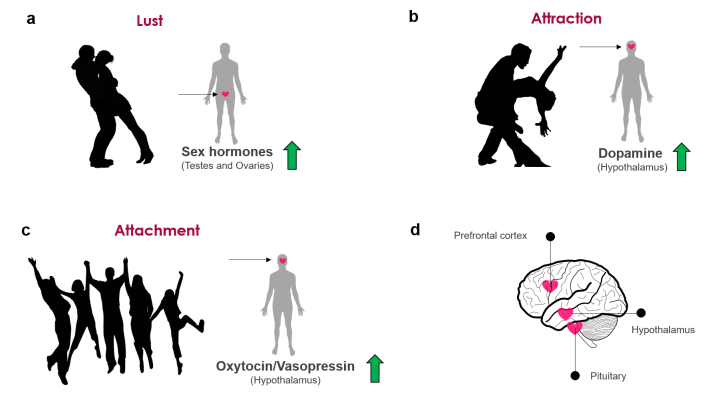 </figure>
</figure>However the issue with having many sexual partners likely has something to do with dopamine, vasopressin and more importantly, oxytocin. Oxytocin is the so-called ‘love’ hormone which helps us develop social bonds.
Oxytocin and dopamine interact to link the neural representation of partner stimuli with the social reward of courtship and mating to create a nurturing bond between individuals. Vasopressin facilitates mate-guarding behaviors, potentially related to the human experience of jealousy. -The Neurobiology of Love and Pair Bonding from Human and Animal Perspectives
Sex initiates a flood of oxytocin, and as mentioned earlier, women have significantly more oxytocin than do men, about 4x that of men. This may be why women are more likely to want to cuddle (especially if they’ve had an orgasm) after sex than men. However, oxytocin may be part of the reason why women are far more likely to feel more regret after one-night stands. A study of 169 men and women found that 32% of men and 72% of women said they would feel guilty after a one-night stand.
“The dramatic behavioral consequence of partner loss is increased depressive-like behavior reminiscent of bereavement. Importantly, infusions of oxytocin into the striatum of adults prevents the onset of depressive-like behavior following partner loss…” -Oxytocin and Social Relationships: From Attachment to Bond Disruption
Research suggests that being separated from someone dear to you results in a depressive-like behavior due to a drop in oxytocin.(S1, S2) Thus, we should expect that if after the acute rise in oxytocin from sex the woman realizes the man is actually not interested in seeing her again, this would be equivalent to a mini “separation” and lead to an unpleasant decrease in oxytocin.
On that note, a 2006 study that found women were much more likely to experience depressed mood after hooking up with a stranger than were men.
<figure> </figure>
</figure>So what does this have to do with men preferring innocent women?
Well, several articles on the internet claim that research from the Medical Institute for Sexual Health suggests that casual sex leads to a decrease in the production of oxytocin and therefore interferes with making meaningful bonds with future partners. However, the link to the Medical Institute for Sexual Health article is broken and I have not been able to find any papers that specifically state that repeated sex decreases (or increases) future oxytocin production, or if frequent casual sex downregulates oxytocin receptors.
However, Dennis Leap, reporting on the work of Dr. Joe McIlhaney and Dr. Freda Bush says:
Science also affirms a destructive downside to casual sex. The doctors explain: “[E]very time a person has sexual intercourse or intimate physical contact, bonding takes place. Whenever breakups occur in bonded relationships there is confusion and often pain in the brains of the young people involved because the bond has been broken.”The problem described here also has much deeper and long-lasting effect. The authors report: “Further, there is evidence that when this sex/bonding/breaking-up cycle is repeated a few or many times—even when the bonding was short-lived—damage is done to the important, built-in ability to develop significant and meaningful connection to other human beings.”
Dr. Juliana E French and her colleagues asked 204 newlywed couples about their sexual histories before meeting their spouse. They followed up several times a year to track various aspects of their relationships including how satisfied they were with the marriage. As Dr. French explains:
It turns out that marriage is less satisfying and less likely to last for people who are high in unrestricted sociosexuality or who have unrestricted partners. Specifically, people who had a history of casual sex and expressed positive attitudes toward and a desire for casual sex began their marriages less satisfied than people who are not sociosexually unrestricted. Moreover, after getting married, their partners experienced rapid declines in relationship satisfaction, which ultimately increased the likelihood of divorce.
In Evolutionary Psychology, Dr. Buss explains that men consistently rate unfaithfulness as the absolute least desirable characteristic in a wife and gave faithfulness the highest possible rating. Men logically infer a higher chance of future infidelity if his partner was promiscuous in the past.
One of the best predictors of extramarital sex is premarital sexual permissiveness—people who have many sexual partners before marriage are more likely to be unfaithful than those who have few sexual partners before marriage. (Thompson, 1983; Weiss & Slosnerick, 1981)
Dr. Buss explains that many behavioral dispositions develop in response to the opposite sex’s preferences. If you think about what the function of a woman feeling guilty or experiencing a depressed mood after a one-night stand is, it may be a mechanism to keep her from becoming unappealing to her ideal mate/partner/husband.
<figure> </figure>
</figure>Jealous primates don’t value promiscuity
Pop Culture Detective indeed gets it right that men desire innocence. After all, if men didn’t value innocence, the “born sexy yesterday” trope wouldn’t exist. Yet, at the end of the video he turns around and says on the contrary, “innocence is not sexy. Knowledge and experience, on the other hand, now that's, that's extremely sexy.”
Before that he says “we need media where men enthusiastically embrace women who are their equals. Equals in everything, including in matters of love and sex,” so it’s safe to say he’s also saying sexual experience in women is sexy. If promiscuity was sexy, why would men be hardwired to be jealous or engage in “mate guarding?”
While less studied than oxytocin, vasopressin also plays a big role in social dynamics. In specific, research suggests that vasopressin may be one factor in men’s jealousy or “mate-guarding,”(S2) but there are many studies that also implicate testosterone in jealousy. Some studies posit that people’s genes, by mediating the action of vasopressin, may have an effect on their propensity for jealousy.
Some individuals may have higher levels of vasopressin and thus exhibit more notable behaviors of aggression, pairbonding, territory protection, and anxiety.
Studies on primates find that males experience an increase in cortisol when seeing their mate with an unfamiliar male.(S)
Behaviorally, jealousy plays a role in mate-guarding and ensuring production of the best possible offspring. Higher levels of jealousy have a dangerous role in human culture and can be seen in cases of spousal homicide when the female displays acts of infidelity, or if the male suspects it (Daly and Wilson, 1988). The question remains whether there are biological reasons for higher levels of jealousy in some and not others. -Endocrine and Psychophysiological Correlates of Jealousy and Social Anxiety in Healthy Adults: Elevated Responses to InterMale Competition
While not much can be said about what this means for male and female humans’ “innate” preferences, it is interesting to note that there are significant sex differences in the function of vasopressin receptors. According to Sex Differences in the Regulation of Offensive Aggression and Dominance by Arginine-Vasopressin ,activation of vasopressin receptors (V1aRs) in the hypothalamus stimulates offensive aggression in males, but in females, activation of vasopressin receptors inhibits aggression.
In any case, a lot of research links testosterone to jealousy and men have 10x the testosterone of women. This is not to say that women don’t get jealous, but just that men with their high levels of testosterone are unlikely to find a woman’s rich and diversified sexual past appealing.
If “experience” was sexy and “innocence” was in fact not sexy, why would men be hardwired for jealousy and why would so many cultures have consistently valued virginity? This is the same point I made about the polyamory promoting book Sex at Dawn. The case they make for polyamory kinda makes sense until you think about the fact men are hardwired to absolutely hate it.
Another possible paternity probability mechanism is valuation of chastity in a potential mate (Dickemann 1981). Males who preferred chaste females in our environment of evolutionary adaptedness, ceteris paribus, presumably enjoyed greater reproductive success than males who were indifferent to the sexual contact that a potential mate had with other males. Prior to the use of modern contraceptive devices, chastity of a potential mate would provide a cue to paternity confidence -Sex differences in human mate preferences: Evolutionary hypotheses tested in 37 cultures
The Evolutionary Psychology textbook even points out that women call their competition ‘sluts’ because they are well aware that men value chastity in women.
An even larger sex difference centers on derogation of the rival’s sexual fidelity. one derogation tactic, “calling competitor promiscuous,” violates men’s desire for a faithful wife with such acts as “called rival a tramp,” “told others that the rival had slept around alot,” and “told others that the rival was loose, and would sleep with just about anybody.” Calling a competitor promiscuous was judged to be more effective for women than for men. We can conclude that women’s derogation tactics are sensitive to men’s long-term mate preferences, especially on the dimensions of physical appearance and desire for fidelity."
On the flip side, it’s also pointed out that men accuse their competitors of being ‘losers’ who are lower in achievement or socioeconomic status than they appear because they know that this is what women value.
Of course men aren’t the only ones getting shamed for their mating strategy. Men get called insecure, women get called “gold diggers.”
At the end of the day, again, this is not about a prescription of what men should want. Dr. Buss also points out that contrary to some in the social sciences claiming that “love” is a relatively recent invention introduced a few hundred years ago by romantic European poets, love is a pretty consistent phenomenon. An analysis of 168 cultures by William Jankowiak and Edward Fischer found evidence for “love” in 88.5% of the cultures. Further, several underlying brain mechanisms involved in love have been identified. So, if you love someone, you love someone - this post isn’t criticizing people’s preferences. By the same token, I don’t think men should be criticized for preferences that seem to be completely natural and come pre-hardwired into most men.
There are obvious benefits to dating a woman who can contribute to the household income, especially considering as of recent it’s not very easy to raise a family on one person’s income. However, lately, a lot of messages to men seem to be crafted to get men to go against their natural imperatives and support the more recent feminist messaging including the idea that women should focus more on their career than having children.
For example:
(a) Being concerned about a woman’s sexual past is now “insecure.”
(b) Wanting a girlfriend to dress modestly is possessive and “disempowers” her.
(c) Wanting to take the lead in a marriage is some form of misogyny (yet women desire a man who is more competent in most metrics.)
(d) Not being attracted to a woman’s career or capital (and potentially being less attracted to her due to it raising the bar for attraction) is insecure.
(e) Not being attracted to competitive, ambitious and career focused woman because these are are masculine traits is insecurity.
(f) Being concerned about a woman’s focus on her career because this will interfere with time spent on child-rearing is (probably) misogyny.